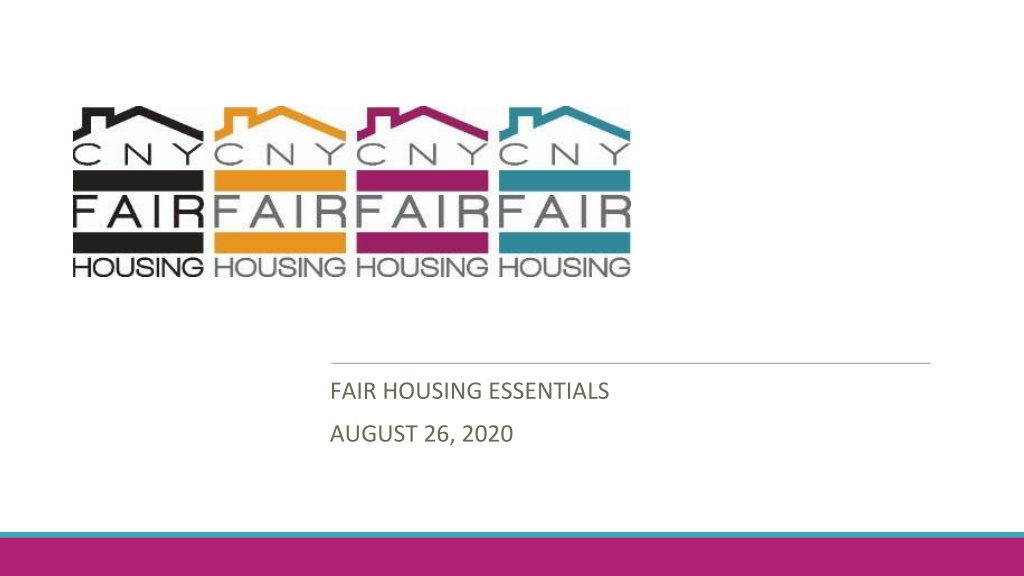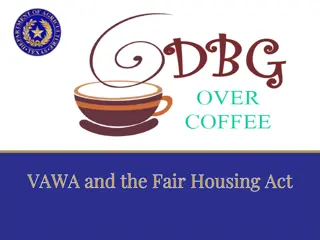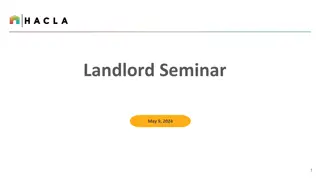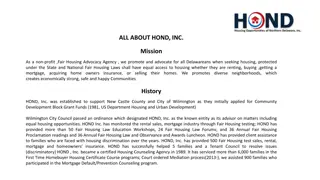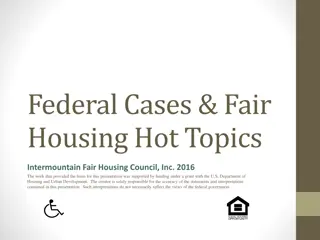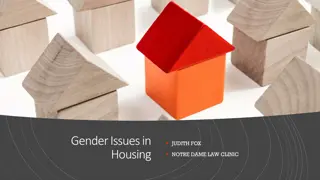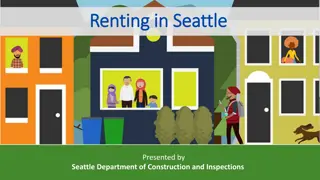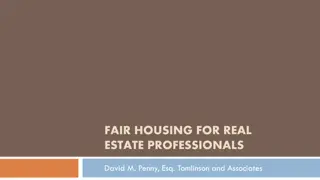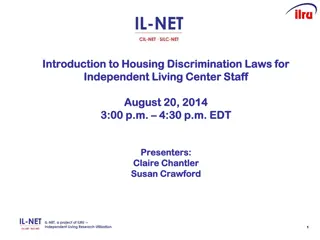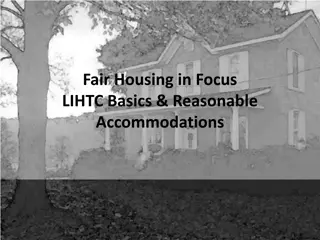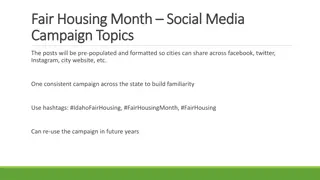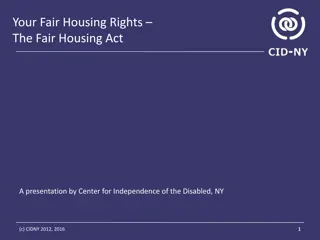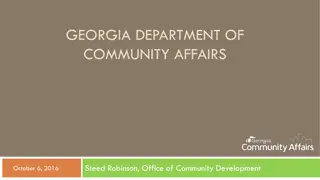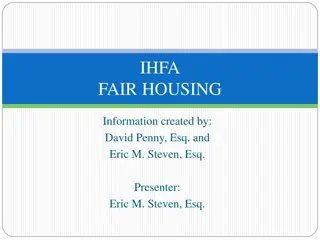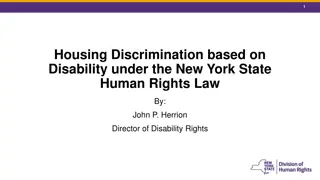Understanding Fair Housing Laws: Essentials and Protections
Explore the essentials of fair housing laws, including protected classes, covered entities, prohibited conduct, illegal behaviors, and discriminatory advertising. Learn about CNY Fair Housing's role in investigating housing discrimination and providing legal representation, as well as the specific classes protected under federal and state laws. Understand what behaviors are considered illegal under fair housing regulations and the importance of complying with these laws to ensure equal housing opportunities for all.
Uploaded on Sep 29, 2024 | 0 Views
Download Presentation

Please find below an Image/Link to download the presentation.
The content on the website is provided AS IS for your information and personal use only. It may not be sold, licensed, or shared on other websites without obtaining consent from the author. Download presentation by click this link. If you encounter any issues during the download, it is possible that the publisher has removed the file from their server.
E N D
Presentation Transcript
FAIR HOUSING ESSENTIALS AUGUST 26, 2020
About CNY Fair Housing Private, non-profit organization founded in 1991 Investigate housing discrimination and provide legal representation to victims of discrimination
Protected Classes Under Fair Housing Laws Federal Law: Race Color National Origin Religion Sex/Gender Disability Familial Status State Law: Age Marital Status
Who (and what) is covered by fair housing laws? Fair Housing laws apply to: Landlords Housing staff Leasing agents Management companies Real estate brokers Owners Homeowner s insurers Mortgage lenders What housing is covered? In New York State, any housing except owner-occupied buildings with two or less units are covered by fair housing laws Race and color protections apply to every housing unit However, under certain circumstances, age- restricted senior housing is permitted
Prohibited Conduct A landlord cannot, on the basis of a protected class: Refuse to rent or sell an apartment or house Lie about availability of housing Steer applicants into or away from certain areas of a building or to different buildings or neighborhoods to segregate populations
What conduct is illegal? Set less favorable terms and conditions Charge higher rents Insist on month-to-month instead of one-year lease Differences in application process or requirements Require more invasive background checks Applying property rules differently because of protected status
Discriminatory Advertising It is illegal to post, or cause to be posted, any advertising or statement that indicates a preference, limitation, or discrimination This includes posted signs, newspapers, Craigslist, Facebook, and others
Source of Income NEW LAW THAT TOOK EFFECT IN APRIL IN NEW YORK STATE CANNOT BE DENIED HOUSING OR TREATED DIFFERENTLY BECAUSE YOU RECEIVE SECTION 8 OR PUBLIC ASSISTANCE LANDLORDS CAN NOT ADVERTISE NO SECTION 8 OR NO PA OR NO PROGRAMS LANDLORDS MUST BASE INCOME REQUIREMENTS ON THE TENANT S SHARE OF THE RENT
Familial Status Familial Status: families with children under the age of 18, pregnant women, anyone who has or is trying to obtain custody of minor children (adoption, foster care, grandparents) Very small bedrooms can be limited to one person Large bedrooms may be able to have three people Children under 2 do not count when determining the number of people per bedroom. Landlords can limit the number of people that live in an apartment, but it has to be based on the size of the apartment.
Harassment Sexual Harassment Quid Pro Quo: requests for sex in exchange for housing or housing services Hostile Living Environment: conduct that is severe or pervasive Harassment can be written, verbal, or other conduct, and does not require physical contact Protections include harassment based on race, national origin, sexual orientation, etc. May include harassment by the housing provider, their staff, or by neighbors.
Blanket bans on individuals with criminal histories are considered discriminatory Housing provider should conduct an individualized assessment that considers: Nature and severity of offence Time since conviction Behavior in intervening time Provider should be prepared to show their policy serves a substantial, legitimate, nondiscriminatory interest Criminal Background Screening
Domestic violence survivors are protected under fair housing laws and other state laws Housing providers can not evict domestic violence victims because of incidents or police activity at the property Local governments can not require that landlords evict domestic violence victims because of police activity Domestic violence survivors living in subsidized properties have rights under VAWA Emergency transfers Self-certification by survivors Can t deny housing due to adverse effects of abuse Domestic Violence
Disability Discrimination Housing providers: Cannot refuse to rent or sell to prospective residents based upon their disability; Should not ask questions about the nature or extent of a person s disability; Are obligated to provide equal access and opportunity for persons with disabilities to use and enjoy the housing.
Accommodation: a change, exception, or adjustment in normal rules, policies, practices, or services offered by a housing provider to allow persons with disabilities the full use and enjoyment of their dwelling and related facilities. Reasonable Accommodations
Assistance animals Assigned parking spaces Transferring Units Reasonable Accommodation s - Examples Communication methods Trash Pickup Snow Removal Leniency for behavior that violates a lease
Reasonable Modifications Modification: a structural modification that is made to allow persons with disabilities the full use and enjoyment of their dwelling and related facilities.
Ramps Grab bars Reasonable Modifications - Examples Sidewalks Flashing smoke alarms or door bells
Reasonable Modifications Private housing - tenant is responsible for paying for modifications within their units while the landlord is responsible for paying for some modifications to common areas. Federally subsidized housing (public housing & other HUD subsidized housing) - housing provider is responsible for costs of all modifications.
Any person who has a physical or mental impairment that substantially limits one or more major life activities; has a record of such impairment; or is regarded as having such an impairment. Disability Under Fair Housing Laws Examples include mobility impairments, visual or hearing impairments, major diseases, mental illness, depression, anxiety, PTSD, & autism.
What is Reasonable? Changes that do not impose an undue financial and administrative burden or that would fundamentally alter the provider s operations Takes into account: the financial resources of the provider the costs of the accommodation or modification the benefits to the requester the availability or other, less expensive alternative options
What is required for a reasonable accommodation or modification? Request does not need to be made in a particular way Tenant just needs to make their needs known to housing provider Recommend that requests be made in writing and ask that the housing provider responds in writing A housing provider may have a particular form or process for requesting an accommodation or modification but they can not require that the tenant use that form or process.
What is required for a reasonable accommodation or modification? If the disability is not obvious, person should be prepared to provide information from a third party that: verifies that they meet the Act s definition of disability describes the needed accommodation or modification shows the relationship between the person s disability and the need for the requested accommodation and modification
What is required for a reasonable accommodation or modification? Housing provider cannot place excessive restrictions as a condition of granting the accommodation or modification Housing provider cannot charge additional fees as a condition of granting the accommodation or modification Includes pet fees and pet deposits for assistance animals, parking fees, or transfer fees if an individual needs to switch units for a disability related need Cannot be called an administrative fee Excessive delays in granting accommodations or modifications may also be violations
Sign a lease Make all requests in writing and ask for all responses in writing and keep copies of all paperwork Tips in Protecting Rights Get receipts for all rent payments Keep a log of your housing search including what housing providers you ve contacted and what happened Take photos of the apartment before you move in and right after you move out If you are being harassed by the landlord or a neighbor, you can record your interactions
Fair Housing Questions/Inquiries? CNY Fair Housing, Inc. 731 James Street, Suite 200 Syracuse, NY 13203 Phone: (315) 471-0420 Website: www.cnyfairhousing.org
